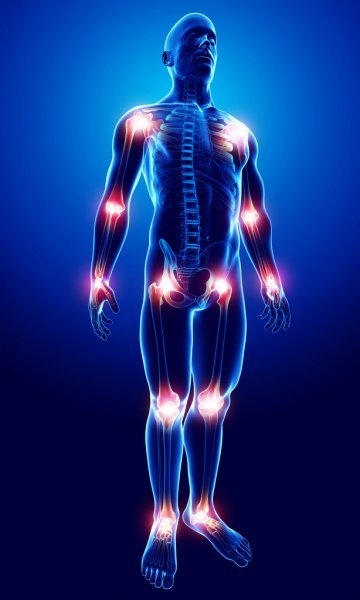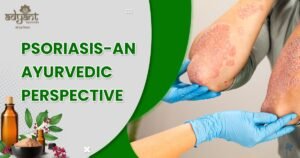Ayurveda for Arthritis
Arthritis means inflammation or swelling of one or more joints. There are more than 100 types of Arthritis conditions identified. Ayurveda for Arthritis involves management for pain and reduction in symptoms as well as it helps in the control of future complications. Rather it’s a complete solution for Arthritis.
All of these arthritides can be divided into two types of subgroups.
1) Degenerative Arthritis
2) Inflammatory Arthritis
Common Symptoms
Types of Arthritis / 6 Common Types of Arthritis
Most types of arthritis include pain, stiffness, and swelling in the joint. Herewith discuss a few types of Arthritis.
1) Rheumatoid Arthritis: It is an inflammatory type of Arthritis. Rheumatoid arthritis is an autoimmune disorder where the body attacks the synovial fluid in the joints, therefore stiffness, pain, and possibly deformities in the affected joints.
2) Osteoarthritis: This type of degenerative arthritis is so common; many people refer to “arthritis” mean just osteoarthritis. Osteoarthritis is the break-down of cartilage in a joint from ageing or repetitive movements. Heavyweight is also one more reason for Osteoarthrosis. Therefore chances are more to break down of cartilage.
3) Ankylosing Spondylitis: Ankylosing spondylitis (AS) mainly affects the spine. Pain and stiffness are the primary symptoms and the condition can lead to the bones of the joints being fused together. This reduced flexibility eventually results in a hunched-forward posture. Pain in the back and joints is also common.
4) Gout: Gout is an often painful type of inflammatory arthritis caused by a buildup of uric acid in a joint. Gout commonly affects the big toe, though other joints in the foot, knee, elbow, wrist, and fingertips can become painful as a result of gout.
5) Fibromyalgia: Fibromyalgia is a chronic and widespread musculoskeletal pain syndrome, the hallmarks of which are tenderness, amplified pain, and severe fatigue. Unlike arthritis, the pain is not typically related to inflammation.
6) Psoriatic Arthritis: Psoriatic Arthritis is a condition where psoriasis of the skin is linked to joint inflammation, commonly in the outmost joints of the extremities. Skin symptoms generally present before joint problems are detected.
Common Symptoms of Arthritis / Signs of Arthritis
The most common signs and symptoms of arthritis involve joint pain and stiffness and therefore reduction in flexibility. Depending on the type of arthritis you have, your signs and symptoms may include:
- Pain
- Stiffness
- Swelling
- Redness
- Decreased range of motion
Ayurveda view about Arthritis
Ama and Vata are the main causative factors for joint pain. Ayurveda treatment for Arthritis includes the main procedure is Ama Pachana along with Agni Deepana, and Vatahara Chikitsa involves. Many times aggravation of Pitta Dosha and cough dosha’s are also a cause for Arthritis. Because of Ama and Vata internal inflammation increases and as a result, it aggravates Pain and stiffness.
Can Ayurveda cure arthritis?
Proper Ayurveda treatments, Diet, Exercise, Medications help to get relief from symptoms and it also helps in further complications.
Few Ayurvedic herbs are used in the treatment of Arthritis.
- Shallaki
- Dashmoola
- Ashwagandha
- Shunthi
Ayurveda treatment for Arthritis/ Management of Arthritis
- In Ayurveda treatment involves a balance of Dosh’s, diet, lifestyle modification, Exercise plays a vital role. At Adyanta Ayurveda we prefer Panchakarma Shodhana Chikitsa to support the joints because it so specifically kindles Agni and clears impurities from the system along with Kati Vasthi, Greeva Basthi, Sarvanga abhyanga, Pinda Swdem, Kashaydhara, etc. along with Yoga and internal medications to improve mobility of joints and to reduce internal inflammation.
- Colon cleansing is important and it helps to restore energy to their balance through diet and daily regimen, yoga poses healing exercises. meditation.
- Sandhivata treatment also includes both Samana Chikitsa and Shodhan Chikitsa. Shamana Chikitsa includes Ayurveda oral medicines and external applications. Shodana Chikitsa includes Ayurveda Panchakarma as well as Kayakalpa therapies for detoxification and rejuvenation. Healthy diet habits & lifestyle are equally important in maintaining joint health.
Summary
Consequently, Along with Ayurveda treatments, diet, exercise, lifestyle modifications also are equally important in Arthritis Pain Management.






